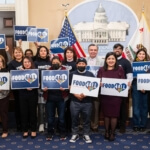Public Health, Medical and Food Insecurity Experts Urge Immediate Action to Rescue Millions from the “Hunger Cliff”
Published on Jun 26, 2023 in Adults, CalFresh, Child Nutrition, Older Adults, State Legislation
Guest Commentary:
Barbara Ferrer, PhD, MPH, MEd, Michael Flood, Omer Deen, MD
As experts working on public health and fighting food insecurity, it’s critical to highlight the link between hunger and its associated negative health outcomes and the looming "hunger cliff." Millions of Americans, especially those from low-income and immigrant communities, are at risk of food insecurity. In addition to the end of pandemic-era emergency allotments for CalFresh (known federally as the Supplemental Nutrition Assistance Program, or SNAP), recent changes to Medi-Cal re-enrollment and the end of local protections – such as the eviction moratorium in LA County – will leave low-income residents in the difficult position of making tough decisions between food, health care, and rent.
People who experience food insecurity are at higher risk of developing health problems such as diabetes, high blood pressure, heart disease, and depression. Children who grow up in food-insecure households are at risk of developmental delays, impaired academic performance, and other chronic conditions such as childhood obesity. Annually, food insecurity costs Los Angeles County alone an estimated $2.3 billion in healthcare costs.
As access to nutritious food decreases and healthy food becomes more expensive, people are more likely to cut corners by purchasing calorie-dense, low-nutrient value foods. The pandemic and the ensuing inflationary cycle have only worsened this problem, with more people experiencing financial hardship. As prices have risen, many COVID-19 emergency provisions have expired, reducing the amount of CalFresh benefits accessible to those who need it most.
But there is hope. Our state has taken important steps toward ensuring food security for all Californians. Bills such as SB 600 and SB 245/AB 311 have the potential to provide much-needed support for those who are facing food insecurity.
- SB 600, the CalFresh Minimum Benefit Adequacy Act of 2023, authored by Senator Caroline Menjivar, aims to provide eligible households with a minimum monthly CalFresh benefit of $50, which will help ensure that all households have access to a basic level of nutrition support.
- SB 245/AB 311, the “Food4All” bills, led by Senator Melissa Hurtado and Assemblymember Miguel Santiago, seek to expand eligibility in the California Food Assistance Program (CFAP) to provide state-funded nutrition benefits to Californians of all ages who are currently excluded due to their immigration status.
- A state budget proposal, the CalFresh Fruit & Vegetable Pilot expansion, led by Assemblymember Dr. Joaquin Arambula, would expand a successful pilot program that provides a $60 incentive for fresh fruits and vegetables purchased using CalFresh at participating grocery stores and farmers markets.
- Lastly, programs already proven effective like CalFresh, which provides food assistance to millions of low-income families, should be adequately funded and accessible to all who need them. A recent report from Nourish California and the San Francisco Bay Area Planning and Urban Research Association (SPUR) highlights the need for increased investment in CalFresh and the expansion of the program's outreach efforts to reach more people in need.
The proposed legislative actions and investment in programs like CalFresh are essential steps in addressing this looming crisis. The Governor and Legislature must work together to make the investments needed to sustain these programs.
As a society, we have a responsibility to prioritize the health and well-being of all members, especially the most vulnerable. We can’t afford to ignore the "hunger cliff," and we need to take immediate action to ensure all Californians have access to the basic human right of nutritious food for themselves and their families.
We urge you to reach out to your elected officials to ask them to support these important bills. You can find your California representative here: https://findyourrep.legislature.ca.gov. It is our job to come together to support our communities.
Barbara Ferrer, PhD, MPH, MEd, is Director of the Los Angeles County Department of Public Health. Michael Flood is President and CEO of the Los Angeles Regional Food Bank. Omer Deen, MD, is President of the Los Angeles County Medical Association and is on the Board of Directors for the National Board of Physician Nutrition Specialists.
Have questions? Contact Jared Call at jared@nourishca.org.
You Might Also Find This Interesting...
![]()



